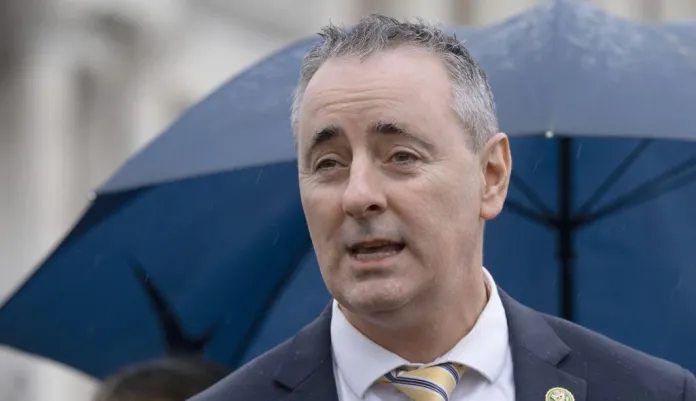Congress unveils last-minute deal to avoid government shutdown
Congress has finalized a stopgap spending deal that will extend government funding until March 14, 2025, just ahead of a deadline that could lead to a government shutdown. The legislation includes a $110.4 billion supplemental package aimed at disaster relief and economic assistance for farmers. Key provisions include $29 billion for the FEMA Disaster Relief Fund, as well as meaningful support for agricultural and infrastructure needs in areas impacted by recent hurricanes.
Negotiations for the legislation were protracted, with disagreements over supplemental provisions causing delays. The bill has drawn criticism from some House Republicans, who view it as a disguised omnibus spending package, which contrasts with House Speaker Mike Johnson’s commitment against such measures. There are also concerns regarding the inclusion of unrelated policy reforms related to drone management and pharmacy benefit managers.
While some lawmakers express that the proposed measures are a good start, others argue that more substantial aid should be prioritized, especially considering upcoming debt ceiling discussions. The final agreement reflects ongoing tensions within Congress regarding fiscal policy and emergency response protocols.
Congress releases stopgap spending deal days before shutdown deadline
Congressional leaders have finalized a deal to extend government spending into the new year, teeing up a vote later this week just days before funding for federal agencies is scheduled to lapse.
House leaders unveiled the legislation Tuesday evening, which will extend current government funding levels until March 14, 2025, and include a $110.4 billion supplemental package for disaster relief and farmers’ economic assistance.
MEET THE NEW CONGRESS: THE HOUSE AND SENATE FRESHMEN ELECTED TO SERVE NEXT YEAR
The legislation comes after weeks of negotiations between House and Senate lawmakers, and it includes a number of policy provisions intended to thwart Chinese influence and respond to recent concerns stemming from drones in U.S. airspace.
The continuing resolution portion of the funding legislation will keep current spending levels for government agencies at the same level while being paired with a supplemental spending bill that includes $100.4 billion in disaster aid relief for states affected by Hurricanes Milton and Helene.
Major provisions tucked in the disaster relief include $29 billion to replenish the FEMA Disaster Relief Fund, $21 billion in disaster relief for farmers, and $8 billion toward the Federal Highway and Roads Disaster Fund, among other things.
The supplemental bill also includes another $10 billion for economic assistance to farmers and a one-year extension of the farm bill, which is set to expire at the end of this year. Some lawmakers said the provisions are not as much as they were hoping for but that it is a start.
“It’ll be good CPR, I’ll put it that way,” House Agriculture Committee Chairman Glenn Thompson (R-PA) said. “It’s not advanced life support, but we’ll have a farm bill that will have a robust safety net soon after the first of the year.”
Legislative text for the continuing resolution was initially expected Sunday afternoon, but that was later delayed amid disagreements on what supplemental provisions and what policies to include in the overarching legislation. Negotiations continued until the final hours before the text was published, with Democratic leaders in the Senate accusing House Speaker Mike Johnson (R-LA) of delaying the legislation by offering a last-minute demand.
“We have been working around the clock to wrap up the CR and the disaster relief bill,” Senate Appropriations Committee Chairwoman Patty Murray (D-WA) told reporters Tuesday. “We should be done, but, unfortunately, we’ve been delayed by an 11th-hour demand from the speaker. We are very close to an agreement, so I look forward to resolving the final issues and getting back on track.”
It is not clear what the alleged 11th-hour demands were, but the 1,547-page legislation is filled with provisions that are unrelated to government funding, such as language to reform how pharmacy benefit managers operate and provisions to allow Washington to redevelop the site of the shuttered Robert F. Kennedy Memorial Stadium and possibly woo the Washington Commanders away from their current location in Maryland.
The bill also includes a reauthorization of the Unmanned Aircraft Systems program intended to “address and counter the potential threats from drones,” according to senior GOP leadership aides. That provision comes as thousands of drone sightings have been spotted above U.S. military bases, prompting concerns about foreign interference.
That unrelated funding has ignited a firestorm among some House Republicans who are criticizing Johnson for what they call an omnibus spending bill in disguise — a term for a package of costly appropriations bills that the speaker has vowed not to ram through.
“Farmers are being dangled,” Rep. Marjorie Taylor Greene (R-GA) told reporters. “Americans that suffered through natural disasters, they’re being dangled with disaster relief. And I think that’s incredibly unfair. If this is going to turn into a three-month omnibus basically, then why aren’t we doing the heavy lifting on the upcoming debt ceiling situations that we have to deal with in March?”
The speaker pushed back on characterizations that the funding bill is similar to the typical Christmas omnibus, arguing that it is a clean extension that includes necessary aid.
“This is a small CR that we had to add things to that were out of our control,” Johnson said. “We’ve got manmade disasters. I wish it weren’t necessary. I wish we hadn’t had record hurricanes in the fall. And I wish our farmers were not in a bind so much that predators are not able to lend to them.”
House GOP aides also rejected the criticism, noting that all the reauthorizations tucked into the bill “have passed the House floor [and] sailed through committee” and that some have “sailed through the Senate.”
The release of the text opens the standard 72-hour review period before GOP leaders could bring it to the floor for a vote. If Republicans follow that, it means the House will likely vote on the legislation under suspension, meaning a two-thirds majority vote will be required, on Friday, just hours before the shutdown deadline. After that, it will be transferred to the Senate before being sent to President Joe Biden’s desk for approval.
Johnson could skirt that 72-hour rule to bring the vote up earlier and ensure the legislation passes with ample time. In fact, some lawmakers were given a tentative schedule earlier this week that indicated a vote would be held on Wednesday.
The speaker committed to Republicans behind closed doors Tuesday that he would stick to the 72-hour rule, but not all lawmakers seem convinced, with one Republican telling the Washington Examiner Johnson “clearly is OK if we don’t.”
Johnson later told reporters he was being “lobbied heavily from people on both sides of the aisle” to bring the legislation to the floor earlier than the 72-hour window — which the speaker said he may comply with.
He also told reporters he wants to advance the CR through regular order and pass it through the House Rules Committee, which would mean it would only require a simple majority on the floor to pass. However, that could be easier said than done, as some conservatives on the powerful Rules Committee have already indicated opposition to the spending bill.
Instead, Johnson could bring the bill up under suspension, allowing him to circumvent the Rules Committee. Either way, it appears Johnson will need to rely on Democratic votes as some rank-and-file Republicans have said they will vote against it on the floor.
That is a possibility Democratic leaders are already planning for.
“The so-called reasonable Republicans are nowhere to be seen as Speaker Johnson tries to jam Trump’s Project 2025 agenda into government funding legislation,” Democratic Caucus Chairman Pete Aguilar (D-CA) said Tuesday. “We know how this ends. This ends in a bipartisan bill that has Democrats and Republicans on a CR.”
Samantha-Jo Roth contributed to this report.
" Conservative News Daily does not always share or support the views and opinions expressed here; they are just those of the writer."




